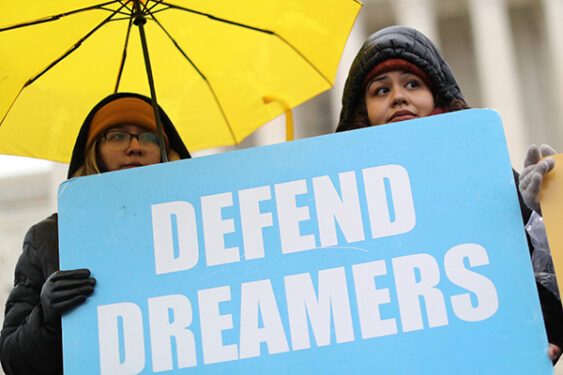
By Rhina Guidos (CNS) and Paula Katinas (Tablet)
BUSHWICK — On the 10th anniversary of Deferred Action for Childhood Arrivals (DACA) — the 2012 executive order signed by then-President Barack Obama — the offices of District Three Youth & Adults Inc. on Wyckoff Avenue was as busy as ever with staff members assisting DACA recipients looking to file renewal applications.
District Three Youth & Adults, formerly known as St. Brigid Immigration Services, handled seven DACA cases on the morning of June 15 — the anniversary date. President Obama signed the executive order creating DACA on June 15, 2012.
DACA offers special immigration status to undocumented immigrants who were brought to the U.S. when they were children by a parent or a guardian. DACA protects them from deportation. It does not offer a path to citizenship or permanent legal status.
District Three, a non-profit organization which specializes in immigration issues, handles approximately 500 DACA cases a year. That’s about 10% of its overall workload, which also includes helping immigrants apply for green cards and guiding people through the process of bringing their spouses and children from overseas to live in the U.S. Most of its clients are from Ecuador.
Msgr. James Kelly, the former pastor of St. Brigid Church in Bushwick who now serves as director of District Three, said DACA recipients live with a great deal of uncertainty and are constantly worried that the program will be rescinded and they will face deportation.
Most DACA recipients have lived in the U.S. most of their lives, speak only English, and have almost no connection to the countries they originally came from, Msgr. Kelly added.
“They’re good people. They’re people we want to have in this country. Many of our DACA people are college graduates. But there’s an anti-immigration sentiment among some Americans,” he said. “They feel the DACA folks are treated too good. The DACA folks would tell you they have contributed to this country by working hard and paying taxes.”
At the Juan Neumann Center in Sunset Park, DACA cases account for a “good portion” of the workload, said Father Ruskin Piedra, the director. The center, which handles a wide variety of immigration issues, including asylum requests, is located at the Basilica of Our Lady of Perpetual Help.
Father Piedra recalled that requests for DACA applications started coming into Juan Neumann as soon as President Obama signed the executive order in 2012 “and we’ve been at it ever since.”
The majority of the center’s clients hail from Mexico and countries in Central America.
DACA recipients are often called Dreamers, after proposed federal legislation known as the Dream Act, which stands for Development, Relief, and Education for Alien Minors Act. The legislation, which has not been passed by Congress, would offer permanent protection for DACA recipients.
Under current rules, only DACA renewals are being processed. No new applications are being accepted following a July, 2021 ruling by a federal judge in Texas. Recipients must apply for renewal every two years.
According to Mayor Eric Adams’ office, there are approximately 30,000 DACA recipients currently living in New York City. Another 53,300 New Yorkers would be eligible to apply for DACA if new applications were being accepted by the U.S. government.
The worries felt in New York over the future of DACA are reflected nationwide.
Standing outside the U.S. Capitol on June 15 pleading for lawmakers to grant her and her peers a path toward citizenship is not how Zuleyma Barajas pictured her life 10 years after she was granted a temporary solution to remain in the U.S.
“I expected we’d be fighting another fight,” Barajas told Catholic News Service saying she was “definitely frustrated” that absolutely nothing has happened in 10 years.
A politically divided Congress has not been able to agree on a comprehensive immigration plan, nor a bill to offer DACA recipients a path to citizenship.
Father Piedra said Dreamers shouldn’t be punished for actions taken by their parents. “DACA applicants have all, in one sense, broken the law. And therefore, those who look at the letter of the law will say they must not become lawful permanent residents in this country. But these children didn’t know they were breaking a law,” he said.
Auxiliary Bishop Mario E. Dorsonville of Washington, chairman of the U.S. Conference of Catholic Bishops’ Committee on Migration, expressed support for Dreamers who constantly worry about their immigration status.
“For those confronted by this reality, the church remains committed to walking with you and seeing this injustice remedied, furthering God’s plan,” he said.
Fran Eskin-Royer, executive director of the National Advocacy Center of the Sisters of the Good Shepherd, speaking in favor of Dreamers, said it was time to “end their nightmares; give them back their dreams.”
A June 2020 poll by the Pew Research Center showed that close to three-quarters of U.S. adults said they favored granting DACA recipients permanent legal status.
Neil Bradley, the U.S. Chamber of Commerce’s executive vice president and chief policy officer, said in a statement that it was “outrageous and unacceptable that after a decade of debate, Republicans and Democrats in Congress have not been able to come together and enact legislation” to protect them.

